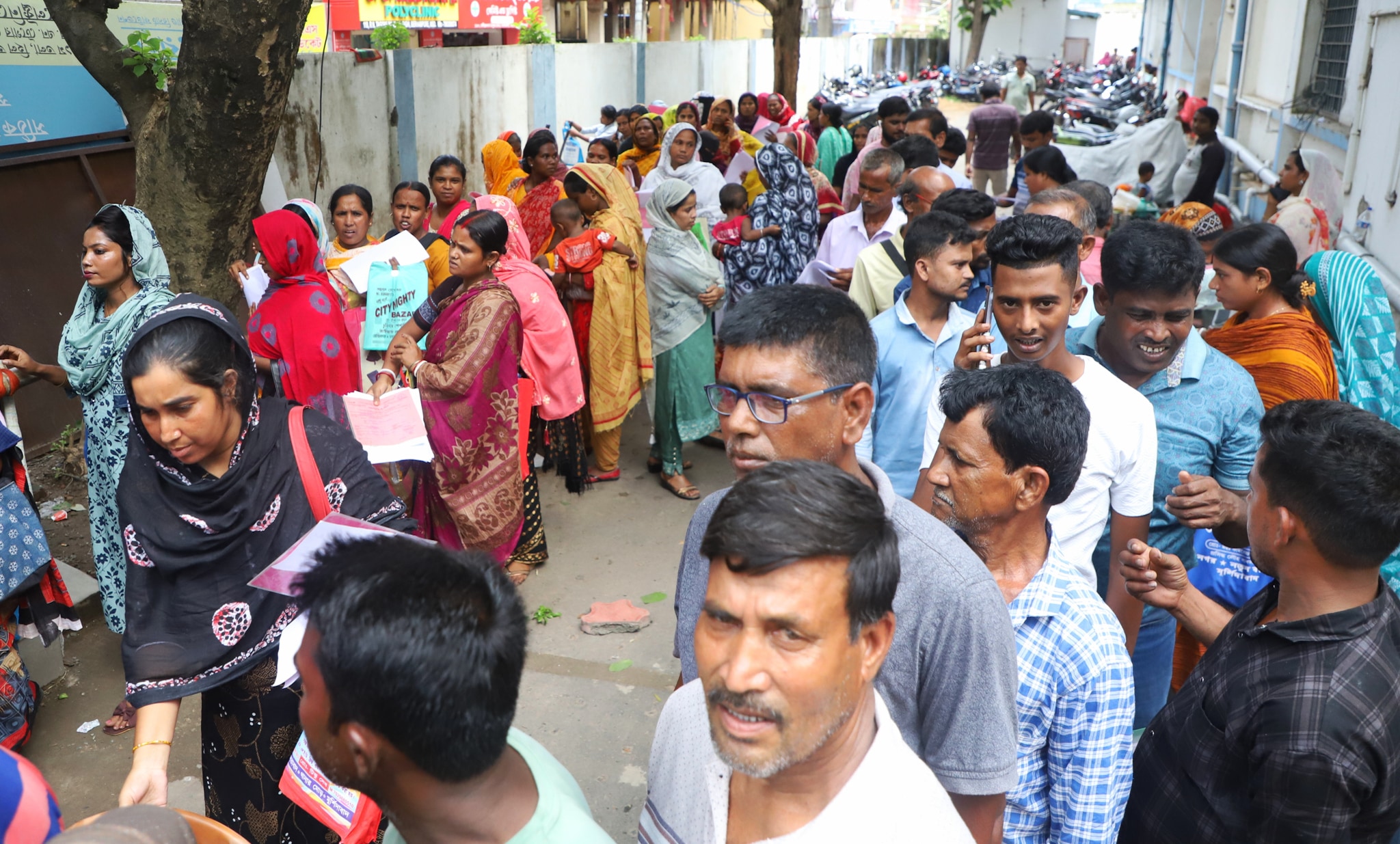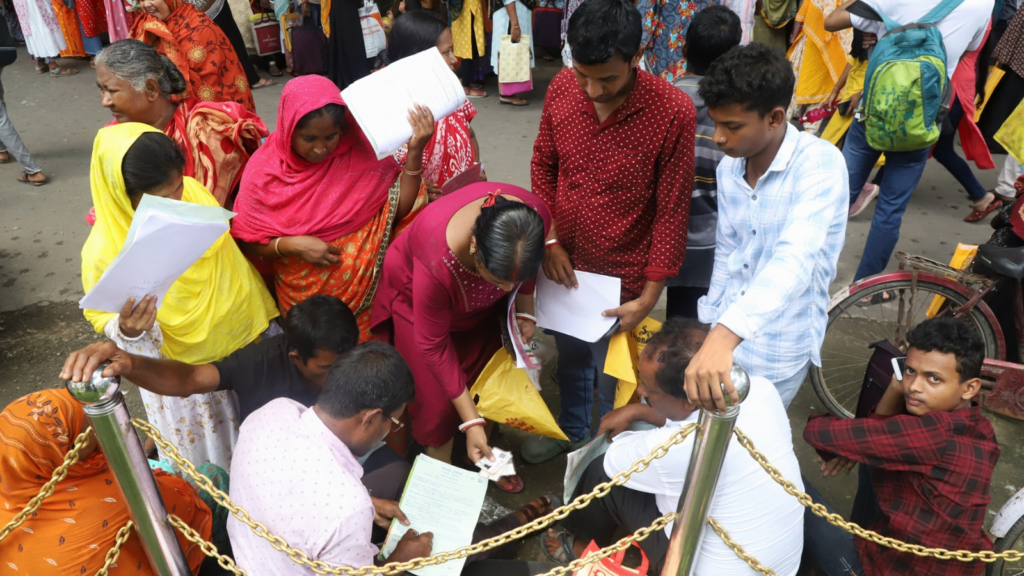IN A letter to the West Bengal Chief Secretary and District Election Officers, the Election Commission set the ball rolling on Wednesday for the revision of electoral rolls in the state that is bound for polls next year.
In Bengal’s Murshidabad and Malda districts bordering Bangladesh, dominated by the Muslim community, the preparations have been on – for a while. At municipalities, in gram panchayats and in courts, people have been lining up with stamp papers – paying double their usual cost of Rs 10 each – to have birth certificates corrected, digitised or “delayed new ones” issued.
Owning a birth certificate is not common in these parts – like in other rural areas of the country. However, the fear is that a Bihar-like Special Intensive Revision may be followed by a drive to compile a National Register of Citizens (NRC), and a birth certificate could decide whether one is certified as an Indian or is deported.
In a notification on July 29, the Trinamool Congress government, which has questioned the SIR, issued a notification laying down clear guidelines regarding birth records.
Now, people are lining up on the ground to ensure that they meet the same.
Abul Kasem Sheikh, 65, has travelled 45 km from his village Amlai to the Berhampore Municipality. All he has to show the birth of his daughter Sajina Khatun at a private nursing home in Berhampore, 20 years ago, is a handwritten document.
Sheikh is among 600-odd men and women queued inside the municipality building, as rain pours outside.
“Lal theke sada korte hobe (I have to get a plain white printout in place of this red certificate). That is what everyone is saying in my village,” says Sheikh.
 People pour in to fill up birth certificate forms in Berhampore. (Express photo by Chayan Majumdar)
People pour in to fill up birth certificate forms in Berhampore. (Express photo by Chayan Majumdar)
That’s the word in her village too, says Samirun Bibi, who has come from Nowda, 38 km away, for digital records of birth certificates of her two sons, 20 and 18, who are both migrant workers. “We cannot take any chances. We need to do this as soon as possible. Any day, they will bring in the SIR and then an NRC. First our voting rights will be gone, then we will be driven out.”
The Mamata Banerjee government, which has accused the BJP of using the SIR to target the Muslim community, has activated the official machinery to help people with their documents.
At the Berhampore Municipality, there are separate makeshift kiosks for ‘form collection’, ‘correction’, ‘delayed new birth certificates’ and ‘digitisation’, with at least 34 officials at hand. Those who had non-institutionalised deliveries or never got birth certificates made qualify for ‘delayed new birth certificates’.
Berhampore Municipality Chairman Narugopal Mukherjee says “there has been absolute panic for the past 10 days”. “We used to get 10-12 applications for digitisation or correction of birth certificates daily; that number is now 500-600. People have been standing here since 7 am.”
Murshidabad District Magistrate Rajarshi Mitra says Sub-Division Officers (SDOs) and Block Medical Officers (BMOs) are handling the process. “A digitised record is proof that a birth certificate is not fake. It will help whenever there is a check,” Mitra says.
Abhijit Sarkar, an official with the ‘Birth and Death Records Department’, who is managing the ‘corrections’ kiosk, says: “We are trying to make people understand that there is no need for the rush. But they are not listening.”
There are similar scenes at the Murshidabad Municipality around 12 km away, with many people losing their patience as the queues crawl. Here, officials have accessed the full birth and death records of the municipality since 1998, as well as the partial lists before it, and kept the same in two rooms of the building.
A senior official says: “Around 120 to 150 people come every day. We are a small municipality, and it is tough. Some people get agitated when asked to show proper records or told to go to court for corrections.”
Sirajul Islam, 61, a resident of Lalbagh, is among those who has had enough. “My wife’s name is Sobha Sarkar in my daughter’s birth certificate and Sobha Khatun in her voter and Aadhaar cards. I have been asked to go to court for an affidavit. This is harassment,” he shouts at officials.
An official says: “We cannot help him without a court affidavit. In our records, her name is Sobha Sarkar. He is refusing to understand the rules.”
The court that is the next stop for many applicants like Islam is District Judges Court, Murshidabad. Here, rows of tables are placed under a makeshift structure, with advocates handling applications.
Syed Rami, 39, the advocate at Table No. 11, says: “I usually require 10-12 stamp papers weekly. Last week, I bought 500, and this week, I have already bought over 600.” The stamp papers are needed by those who require affidavits for corrections in birth certificates.
Rami says people also approach him at home, in his village Sundarpur, where he has a small office. “I have clients lining up till 2 am.”
Rami gives the example of a woman who is called Kajola Bibi in her Aadhaar and voter cards, and Aliya Khatun in the birth certificate of her son Monirul Islam (7). He also has a client whose name was entered as Sheikh Abdul Ahad in the 2002 voter list, prepared after the last electoral revision exercise in Bengal, but is named Abdul Ahad in his Aadhaar card.
“Through affidavits I have to prove that Kajola Bibi and Aliya Khatun, and Abdul Ahad and Sheikh Abdul Ahad, are the same person,” says Rami, who now carries voter lists since 1959 and especially the 2002 one with him at all times.
Apart from the stamp papers which are going for double their usual Rs 10 price, the lawyer fees have also seen a rise. An advocate says: “We charge depending on the status of the applicant and how scared they are. It can start with Rs 150, go up to Rs 2,000 per affidavit.”
The bottom of this chain are the gram panchayats, such as Mahalandi in Kandi, where official Subarna Marjit says he barely steps away from his computer these days. “Daily, 70 to 80 people come for digitising birth certificates, and 20 to 30 for delayed birth certificates. We cannot help with the delayed birth certificates part, as that can be done only by SDOs or BMOs.”
Pradhan Saheba Khatun is also full time at the panchayat office to handle the rush. “People worry that if their birth certificates are not proper, they will be thrown into Bangladesh,” she says.
The Acting BMO at the Primary Health Centre in Gokorno of Kandi Block, Dr Md Noor Alam, has been handling around 30 applications daily for delayed new birth certificates. “Since the onus is on BMOs to clear these, we are very careful. We verify the papers after house visits, by ASHA workers or other staff, and check the credentials. If there are anomalies, we send the applicants to SDOs.”
At Kanupur, gram panchayat secretary Md Samshger Ali worries about the task before him as most of the people in this panchayat are migrant labourers.
About 60 km, at Kaliachowk in Malda district, the story is no different. Jalalpur gram panchayat pradhan Abdur Barek says their reassurances are falling on deaf ears. “People are going through the 2002 voter list and panicking… We are holding awareness meetings, but they are not listening.”
Mohammed Ali, the TMC MLA from Lalgola in Murshidabad, says: “No political party is against the SIR. It happened in Bengal in 2002. But there is a conspiracy to bring in an NRC through the backdoor. That is why people are running to panchayat offices, municipalities and courts.”
Senior Congress leader Adhir Chowdhury, former Lok Sabha MP from Berhampore, says the state government can contain the panic through awareness campaigns, but is not doing this deliberately. “Two parties are benefiting from this, Mamata Banerjee and the BJP… In the 2021 polls too, she took electoral advantage by creating an NRC scare. Now, she is again aiming for political dividends by creating fear among the minorities.”
CPI(M) Central Committee member Sujan Chakraborty blamed the EC for the panic because of the kind of documents it is asking for the SIR in Bihar. “People fear their voting rights will be snatched.”
 People waiting in queue at the Baharampur municipality office. (Express photo by Chayan Majumdar)
People waiting in queue at the Baharampur municipality office. (Express photo by Chayan Majumdar)
BJP state president and Rajya Sabha MP Samik Bhattacharya, however, blamed the TMC for “creating the panic” and “facilitating this rush”. “It is true that a lot of people hold fake documents including Aadhaar cards in Bengal. We have been alerting the EC on this from time to time,” he says.
In the uncertainty, middlemen offering “packages” to get birth certificate work done are filling the gap. Prices can range from Rs 1,000 to Rs 2,000 for digitisation and minor corrections, to Rs 4,000-Rs 5,000 in case a major change is needed, which involves a gazette notification. Some are offering Rs 20 for help in just filling the form.
There is also confusion about the processing fees for applications. While Berhampur Municipality takes Rs 50 per form, in Murshidabad Municipality, the charge is Rs 100. Some gram panchayats are doing the work for free, at others, the processing fees ranges from Rs 50 to Rs 100 per application.
A lawyer at the District Judges Court says it is only the beginning. “Once the SIR is announced, middlemen and cyber cafes will have a field day. People will be ready to pay anything.”
Edward Kabir Riton, 30, who runs a cyber café at Mahalandi gram panchayat, says he is not among those trying to make money off SIR. However, he adds, “Most cyber cafes are busy these days.”

